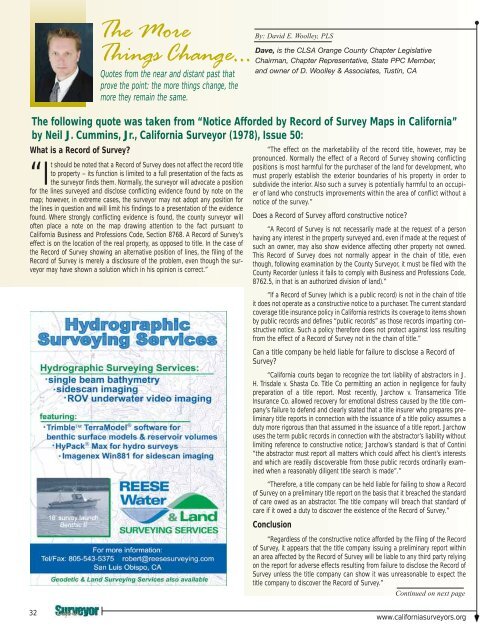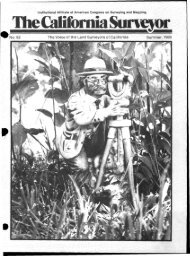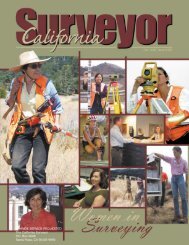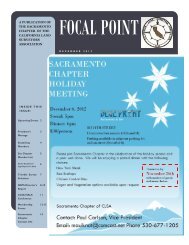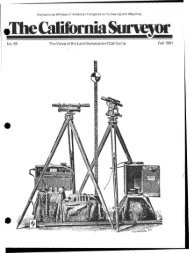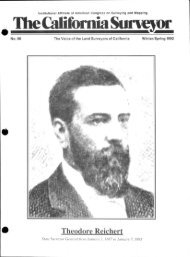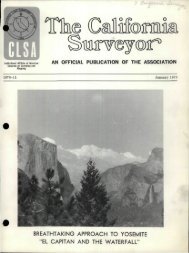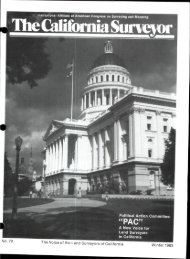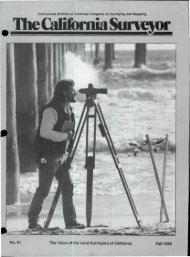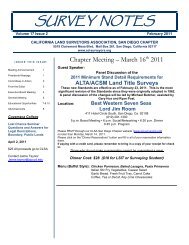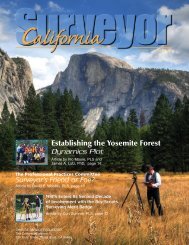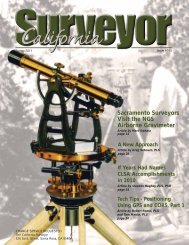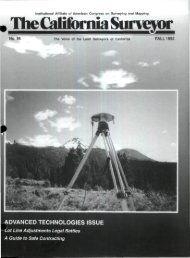Create successful ePaper yourself
Turn your PDF publications into a flip-book with our unique Google optimized e-Paper software.
The More<br />
Things Change...<br />
Quotes from the near and distant past that<br />
prove the point: the more things change, the<br />
more they remain the same.<br />
Dave, is the <strong>CLSA</strong> Orange County Chapter Legislative<br />
Chairman, Chapter Representative, State PPC Member,<br />
and owner of D. Woolley & Associates, Tustin, CA<br />
The following quote was taken from “Notice Afforded by Record of Survey Maps in California”<br />
by Neil J. Cummins, Jr., California Surveyor (1978), Issue 50:<br />
What is a Record of Survey?<br />
“It should be noted that a Record of Survey does not affect the record title<br />
to property – its function is limited to a full presentation of the facts as<br />
the surveyor finds them. Normally, the surveyor will advocate a position<br />
for the lines surveyed and disclose conflicting evidence found by note on the<br />
map; however, in extreme cases, the surveyor may not adopt any position for<br />
the lines in question and will limit his findings to a presentation of the evidence<br />
found. Where strongly conflicting evidence is found, the county surveyor will<br />
often place a note on the map drawing attention to the fact pursuant to<br />
California Business and Professions Code, Section 8768. A Record of Survey’s<br />
effect is on the location of the real property, as opposed to title. In the case of<br />
the Record of Survey showing an alternative position of lines, the filing of the<br />
Record of Survey is merely a disclosure of the problem, even though the surveyor<br />
may have shown a solution which in his opinion is correct.”<br />
By: David E. Woolley, PLS<br />
“The effect on the marketability of the record title, however, may be<br />
pronounced. Normally the effect of a Record of Survey showing conflicting<br />
positions is most harmful for the purchaser of the land for development, who<br />
must properly establish the exterior boundaries of his property in order to<br />
subdivide the interior. Also such a survey is potentially harmful to an occupier<br />
of land who constructs improvements within the area of conflict without a<br />
notice of the survey.”<br />
Does a Record of Survey afford constructive notice?<br />
“A Record of Survey is not necessarily made at the request of a person<br />
having any interest in the property surveyed and, even if made at the request of<br />
such an owner, may also show evidence affecting other property not owned.<br />
This Record of Survey does not normally appear in the chain of title, even<br />
though, following examination by the County Surveyor, it must be filed with the<br />
County Recorder (unless it fails to comply with Business and Professions Code,<br />
8762.5, in that is an authorized division of land).”<br />
“If a Record of Survey (which is a public record) is not in the chain of title<br />
it does not operate as a constructive notice to a purchaser. The current standard<br />
coverage title insurance policy in California restricts its coverage to items shown<br />
by public records and defines “public records” as those records imparting constructive<br />
notice. Such a policy therefore does not protect against loss resulting<br />
from the effect of a Record of Survey not in the chain of title.”<br />
Can a title company be held liable for failure to disclose a Record of<br />
Survey?<br />
“California courts began to recognize the tort liability of abstractors in J.<br />
H. Trisdale v. Shasta Co. Title Co permitting an action in negligence for faulty<br />
preparation of a title report. Most recently, Jarchow v. Transamerica Title<br />
Insurance Co. allowed recovery for emotional distress caused by the title company’s<br />
failure to defend and clearly stated that a title insurer who prepares preliminary<br />
title reports in connection with the issuance of a title policy assumes a<br />
duty more rigorous than that assumed in the issuance of a title report. Jarchow<br />
uses the term public records in connection with the abstractor’s liability without<br />
limiting reference to constructive notice; Jarchow’s standard is that of Contini<br />
“the abstractor must report all matters which could affect his client’s interests<br />
and which are readily discoverable from those public records ordinarily examined<br />
when a reasonably diligent title search is made”.”<br />
“Therefore, a title company can be held liable for failing to show a Record<br />
of Survey on a preliminary title report on the basis that it breached the standard<br />
of care owed as an abstractor. The title company will breach that standard of<br />
care if it owed a duty to discover the existence of the Record of Survey.”<br />
Conclusion<br />
“Regardless of the constructive notice afforded by the filing of the Record<br />
of Survey, it appears that the title company issuing a preliminary report within<br />
an area affected by the Record of Survey will be liable to any third party relying<br />
on the report for adverse effects resulting from failure to disclose the Record of<br />
Survey unless the title company can show it was unreasonable to expect the<br />
title company to discover the Record of Survey.”<br />
Continued on next page<br />
32<br />
www.californiasurveyors.org


